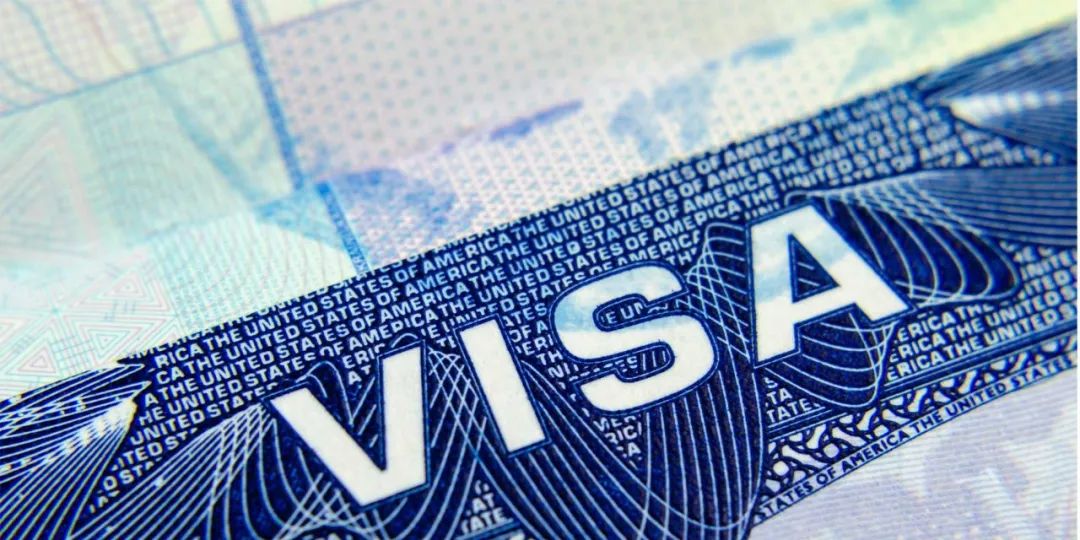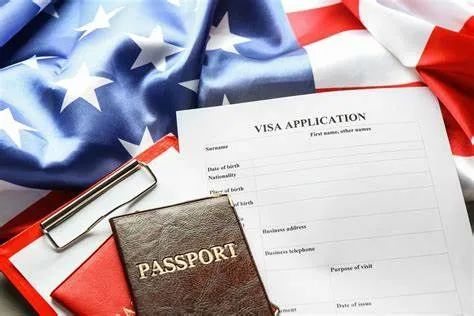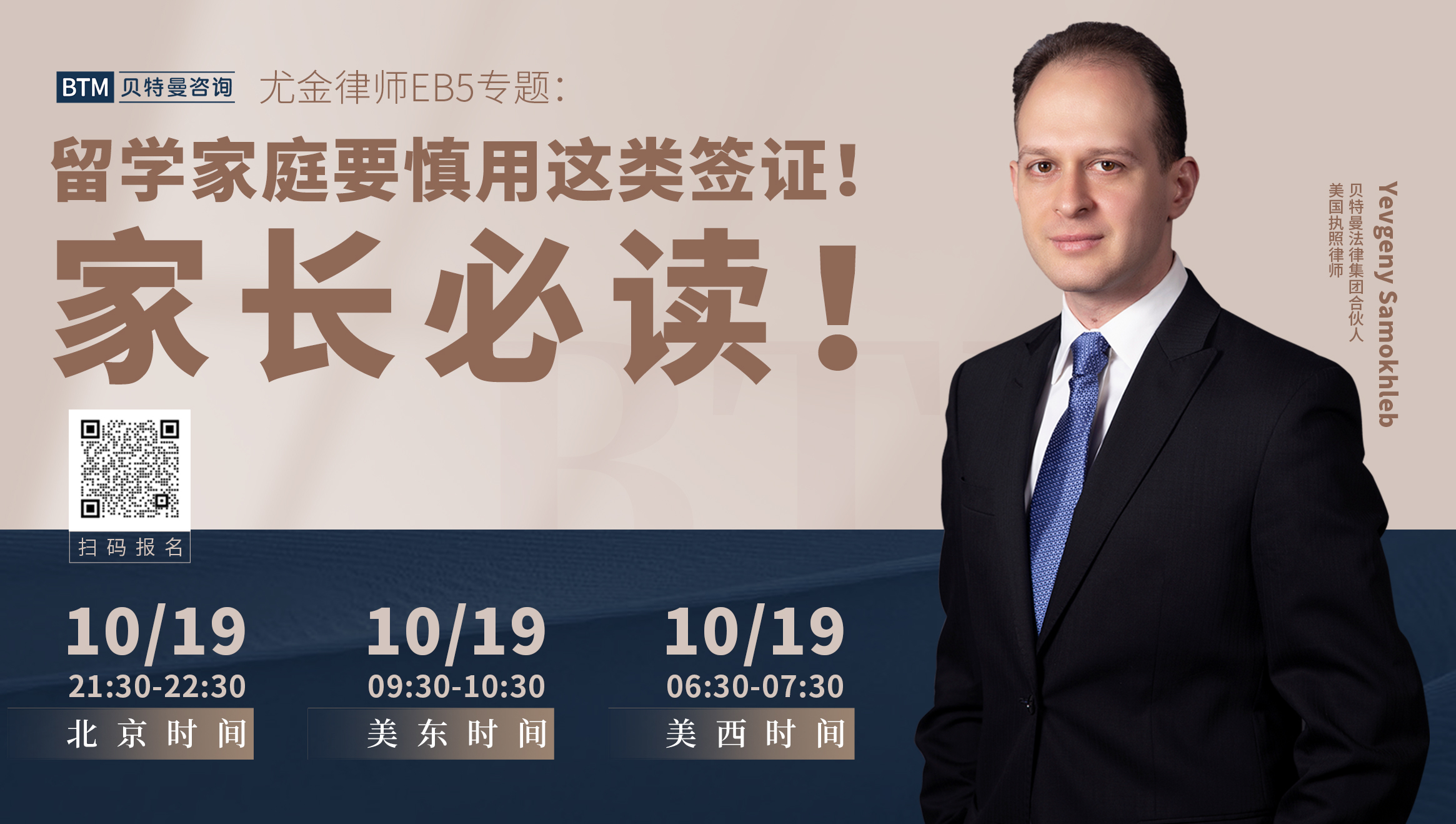
本文作者:Yevgeny(Eugene)Samokhleb
For visitors to the U.S. and prospective immigrants, it is essential to understand the legal concepts of immigrant and non-immigrant intent, as well as the representations made to the U.S. government when applying for a visa. Immigrant intent refers to an individual's subjective intention to seek permanent resident status upon entry, while non-immigrant intent refers to an individual's subjective intention to enter the U.S. with a temporary visa (e.g., tourist visa, student visa, work visa, or other types of visa) and then leave upon the expiration of the authorized period of stay. When entering the U.S. with a non-immigrant visa, you are representing to the U.S. government that your intention to stay is temporary and that your activities during your stay will align with the type of visa you have been granted.
对于前来美国的访客和有意成为移民的人士,理解“移民意图”和“非移民意图”这两个法律概念,以及在申请签证时向美国政府的表态,是非常重要的。“移民意图”指的是一个人在进入美国时,有意寻求成为永久居民的主观意愿;而“非移民意图”则是指一个人计划持临时签证(如:旅游签证、学生签证、工作签证或其他类别的签证)入境美国,然后在许可的逗留期结束时离开的主观意愿。当你持有非移民签证进入美国时,你是在向美国政府表明,你计划的逗留是暂时的,并且你在逗留期间的行为将会符合你所获得的签证类别。
For instance, a student visa (F visa) is exclusively for enrolling in an academic course of study and prohibits employment, except for limited opportunities such as Curricular Practical Training (CPT) or Optional Practical Training (OPT) employment as part of the educational curriculum. Likewise, visitor or tourist visas (B1/B2 visas) are exclusively for short-term meetings, visits, or vacations, and prohibit activities such as working or enrolling in school. Engaging in activities inconsistent with the visa you were granted results in a violation of the visa terms and conditions. Conducting those activities shortly after entry may also raise suspicions of misrepresentation of intentions to the government. For instance, applying for permanent resident status (I-485 Application) within 90 days of entering with a non-immigrant visa may trigger suspicion of misrepresentation. Such visa violations or misrepresentations can cause significant problems and difficulties with your future immigration process.
例如,学生签证(F签)仅限用于注册参加正规的学术研究课程,严禁工作,除非是一些属于教育课程一部分的有限机会,如课程实践培训(CPT)或可选实践培训(OPT)。同样地,访客或旅游签证(B1/B2签)仅用于短期的会议、访问或度假,禁止从事例如工作或报名上学等活动。从事与你所持有的签证不符的活动,将会违反签证的条款。在刚入境后不久就进行这些活动,也可能会引起政府对你意图的质疑。比如,在持有非移民签证入境后的90天内就申请永久居民身份(I-485申请)可能会引发对信息不实的怀疑。这类签证违规或信息不实,可能会给你未来的移民程序带来很大的麻烦和困难。
 图片来源:www.prideimmigration.com
图片来源:www.prideimmigration.com
It is important to emphasize that B1/B2 visa visitors and tourists are explicitly prohibited from enrolling in school. This mistake is often easily made due to conflicting policies affecting education. The U.S. Supreme Court ruled in the case known as Plyler v. Doe, 457 U.S. 202 (1982) that public schools are forbidden from denying enrollment based on a child's immigration status as a matter of public policy on education. However, from an immigration law perspective, enrolling in school while on a B1/B2 visa remains a visa violation.
需要注意的是,持B1/B2签证的访客和游客明确禁止注册入学。这个错误往往很容易犯,因为在美国影响教育的政策存在冲突。美国最高法院在1982年的Plyler诉Doe案中裁定,公立学校禁止根据儿童的移民身份拒绝入学,这是基于公共教育的政策。然而,从移民法的角度来看,持B1/B2签证时注册入学仍然是一种签证违规行为。
Enrolling a child in school while on a B1/B2 visa is automatically considered a violation of visa status. This violation may lead to being barred from adjusting status in the U.S. (i.e., the I-485 Application cannot be approved). Depending on the timing of the enrollment relative to the visa application or entry into the U.S., it may also lead to a finding of visa misrepresentation, which is a serious offense and can create significant obstacles to obtaining a green card. Additionally, a city or other locality may file a civil lawsuit against the student to recover the cost of education. These immigration violations and civil liabilities may also be imputed to the parent.
在持B1/B2签证时为子女注册入学,将自动视为违反签证状态。这种违规可能导致无法在美国调整身份(即,I-485申请不能获批)。根据注册入学的时间与签证申请或入境美国的时间相比较,这种行为还可能被视作谎报签证意图,这是一种严重的违法行为,可能会对获得绿卡造成重大的障碍。此外,城市或其他地方政府可能会对学生提起民事诉讼,以追回教育成本。这些移民违规和民事责任可能也会推诿到父母身上。

图片来源:www.tajtravel.com
It is crucial to familiarize yourself with the rules associated with different visas, seek consultation if necessary, and plan accordingly. Do not enroll a child in school while in the U.S. on a B visa – at least not until the child has a pending I-485 Application. If you have ever committed such a violation, it is vital to inform your legal counsel when participating in any immigration-related activities, such as applying for a visa, green card, or citizenship. Most importantly, do not lie or attempt to conceal any violations, as this can lead to even more severe consequences.
了解不同签证相关的规定,必要时寻求咨询,并做好相应的规划,是非常重要的。不要在持B签证的情况下在美国为孩子注册入学,至少要等到孩子有了正在审理的I-485申请。如果曾经发生过这样的违规行为,在参与任何与移民相关的活动时,如申请签证、绿卡或公民身份,一定要通知你的法律顾问。最重要的是,不要撒谎或试图隐瞒任何违规行为,因为这可能导致更严重的后果。
Understanding the intricacies of immigration law can be overwhelming, but it is necessary to avoid serious consequences in the future. By being aware of the legal requirements and restrictions associated with each visa type, you can make informed decisions and protect your family's interests. If you encounter any uncertainties or challenges, seek legal counsel to navigate the complexities of immigration law and safeguard your future in the United States.
民法的复杂性可能会让人觉得不知所措,但这是为了避免未来的严重后果而必要的学习。通过了解每种签证类型相关的法律要求和限制,您可以做出明智的决定,保护您家人的利益。如果您遇到任何不确定性,请寻求法律咨询,以应对移民法的复杂性,保障您在美国的未来。
--end--
BTM Group thanks Bowen Xue for his contributions to this article.
贝特曼集团感谢Bowen Xue对本文的贡献。
更多精彩内容请预约“尤金律师EB5专题:留学家庭要慎用这类签证!家长必读!”主题对谈分享会。







